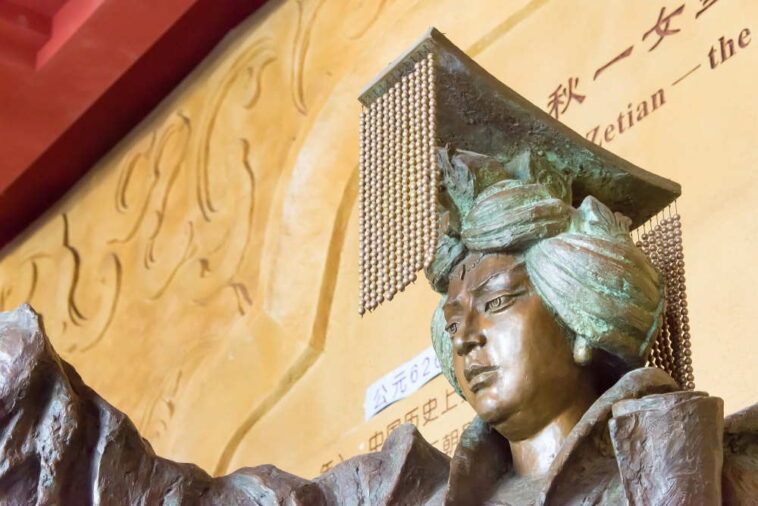Female leaders in history are obviously a lot rarer than their male counterparts. Of course, famous examples like Queen Victoria and Cleopatra exist, and it is perhaps in fact their rarity which makes them stand out among the tens of thousands of leaders who have made their mark on their countries and the world through time. Here we take a look at the astonishing events which saw a middle class girl born in early medieval China become ruler of a nation and an empire, something which would never happen again in its vast history.
The Timber Merchant’s Daughter
The story of Wu Zetian’s rise to power is quite extraordinary. Not only is she the only woman to ever rule China in her own right in its thousands of years of history, but her story is full of more intrigue and cunning than any fantasy a writer could hope to imagine. Born in the year of a solar eclipse, which in Chinese tradition was believed to foretell the future fate of the Emperor, her family lived a comfortable, relatively high-status existence in early medieval China. Coupled with this was a period of relative freedom for the women of China, as foot binding for wealthy women was not yet practiced and some were able to gain influential positions in politics.
At the age of fourteen, she became one of Emperor Taizong’s concubines, which was her key to the otherwise impenetrable Imperial Palace. Her comfortable childhood and encouraging parents allowed her to spend time reading and learning about culture and politics, and her entry to the palace further allowed her to pursue her studies. She observed the internal workings of the palace and the Emperor’s work first hand, and made use of her time to study further. However, while she managed to somewhat impress the Emperor with her intelligence and boldness of character, she was not particularly favored by Taizong. Perhaps luckily for her, he died and was succeeded by his son Gaozong, who was far more fond of her.
Leaving the Palace and a Shock Return
Her tale took a seemingly disastrous turn at this point, however, as she had no children with the former emperor and therefore no longer had any right to remain in the palace. Following tradition, she was sent to a Buddhist temple to spend the rest of her life as a nun. Now Emperor, Gaozong was able to defy tradition and brought her back to the palace as one of his favorite concubines. The lofty ranks of top concubine were extremely competitive and potentially deadly, and she is reported to have killed her own infant daughter in order to frame her rival Empress Wang, who was subsequently executed. Some also believe she killed her oldest son, Crown Prince Li Hong, in order to push herself higher up the line of succession when the sickly current Emperor was to pass away.
Before that happened, though, partly through his favoritism of Wu and partly through advice given to him by his aides, Gaozong eventually made Wu’s son Crown Prince, and thus heir apparent to the throne. While historical accusations of her murdering her own children could never be proved for certain, she did plot to falsely accuse other empresses and important palace staff of various crimes in order to clear the way for her own eventual reign, condemning them to exile or death. She also challenged traditional Confucian beliefs on the positions of women in society, starting a sort of propaganda campaign which aimed to promote the important roles of Chinese women through history by commissioning biographies to make the concept more popular. Essentially, she was continually laying the groundwork for her own place on the throne.
Rise to Power, Death and Legacy
Rising further to the rank of Empress Dowager and then Empress Consort, as the emperors quickly rose to power and died or were deposed around her, she eventually became Huangdi of China in 690, a gender-neutral word for ’emperor’ which distinguished her from the mere consorts and concubines of the leader, at the age of 68. She established a new dynasty, Zhou, which was only to last for the duration of her own reign. She favored the use of secret police and retained a ruthless yet respected position. Her decades of study, observation and assistance in leading China had formed of her a diligent and intelligent leader who was decisive and effective in her decision-making. In 705, at the age of 81, she was forced to resign in a coup by high-ranking officials who sought to instate her third son, Li Xian, as emperor. She died later that year.
While some historians have regarded Wu Zetian as a bloodthirsty, power-hungry woman who would stop at nothing, even killing her own children, for a chance at sitting on the throne, others have dismissed this as a smear campaign to disparage the only woman to have ever truly ruled over China in her own right. Whether or not she was guilty of infanticide, hard evidence exists for her ruthless manner of dealing with those who betrayed or even opposed her, and her reputation in Chinese history remains contentious. As recently as the 1960s, however, Chairman Mao Zedong’s wife used Wu Zetian as part of a campaign to have people possibly consider her a successor to her ailing husband. Whether or not she was guilty of the terrible crimes she has since been accused of, few could have guessed that the baby girl born to the celestial marvel of the solar eclipse in the year 624 would one day become the most powerful person of the vast Chinese empire.




Comments
0 comments